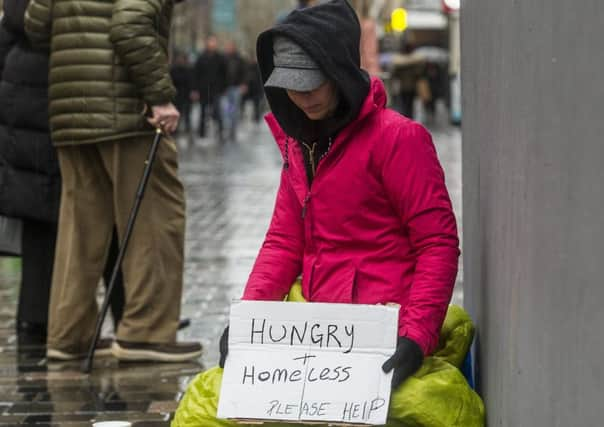Darren McGarvey: Contempt for the homeless shames all of us
This article contains affiliate links. We may earn a small commission on items purchased through this article, but that does not affect our editorial judgement.


Speaking to a newspaper at the time, Robert Aldridge said: “This survey asks many things about people affected by begging and beggars but, in our view, is asking leading questions which will skew the survey responses in favour of those that are negative about begging within Glasgow.”
He added: “There are a myriad of reasons why a person will beg, however, what is true for all who have to beg is that they are living a life of poverty and destitution, with bleak prospects for the future. They are in need of support not vilification.”
Advertisement
Hide AdAdvertisement
Hide AdThe fact someone had to chin a public institution – the local authority – for vilifying beggars is, perhaps, a clue to the sort of morally ambiguous waters we’ve been treading as a country when it comes to the issue of homelessness.
The problem is now so visible it’s not even possible to turn a blind eye; every third bin on the high street has become a coveted spot for a rotating cast of rough sleepers dependent on the generosity of the public to survive. While it’s easy – and tempting – to attribute responsibility for this solely at the door of politicians, the truth is there’s a lot of blame to go around and ultimately the buck stops with us, the citizens of this country, who tacitly permit this outrage every day we pretend it’s not our problem.
Speaking personally, sometimes the sense of helplessness in the face of such a massive problem like homelessness manifests as irritation at the homeless themselves. But this is delusional and unfair.
When you’re doing well in life, it’s easy to become detached from the reality of genuine hardship. It becomes reasonable to make glib arguments about how poverty is relative and that people in this country don’t really know real hardship and need to man up and pick themselves out of the gutter. But one area where poverty is not relative is in how it affects children.
Kids who live in poverty, no matter where they are found, are exposed to a similar risk of harm, neglect, abuse and exploitation, whether it’s child prostitutes on the streets of Athens, drug-addicted kids in South America or the systematic sexual abuse of orphans or refugees washing up on the beaches of Europe. Being poor increases the risk that vulnerable children face and the trauma inflicted can alter the direction of the victim’s life.
People end up homeless for all sorts of reasons but a recurring theme is family breakdown, dysfunction and abuse. It’s regularly the case that people who become homeless – to the extent that they end up sleeping rough – hail from troubled backgrounds that involved neglect and abuse. We look at problems like child abuse, addiction and homelessness in isolation but as anyone working with the homeless, or addicts of victims of abuse, will tell you, the problems are often interconnected.
I became homeless at 18 after a psychological breakdown, following the sudden death of my mother. Her own life was cut short by drink and drug addiction. It’s in these highly stressful conditions that young people are kicked out of their homes and it’s just your luck what sort of crowd you end up in. Fortunately, I was referred to a supported accommodation project where I lived for three years and never had to sleep rough.
But these vital services, safety nets for those with little family support, are the first things to be cut when the axe of austerity falls. And you need only walk the high street in your town or city, where many victims of neglect and abuse end up sleeping rough, to see how short-sighted and self-defeating these ‘efficiency savings’ really are.
Advertisement
Hide AdAdvertisement
Hide AdLet’s not beat about the bush here: homeless people are treated with utter contempt by government, local authorities and broad swathes of the public. At best, the homeless have become political footballs that exist solely to apportion blame in a very tedious game of partisan point-scoring. At worst, they are regarded as subhuman eyesores, deserving of their destitution. The current status quo, where one person perishes every week on the streets of Scotland, is a national disgrace.
Then again, it’s only heroin users, ex-prisoners, people with mental health problems and, generally speaking, those who cannot advocate for themselves that end up sleeping rough, so nobody really has to worry about the repercussions for the gridlock, do they? The truth is, everyone working in this sector knows what’s going on but people are either too afraid to go public or have become desensitised to how serious this matter really is – just like the rest of us.
As active and engaged citizens, it falls upon us to remind our representatives that some issues are more important than party politics. We have to send a message to all parties that they should expect their feet – and every other extremity – held well-and-truly to the fire, until this stain on our national conscience is addressed once and for all.
You can start now by supporting local activists working hard to bring this issue to wider public attention – see www.facebook.com/GlasgowshamelDarren McGarvey is also known as Loki, a Scottish rapper and social commentator @lokiscottishrap